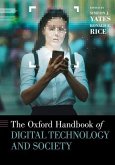The Oxford Handbook of Networked Communication
Herausgeber: Foucault Welles, Brooke; González-Bailón, Sandra
The Oxford Handbook of Networked Communication
Herausgeber: Foucault Welles, Brooke; González-Bailón, Sandra
- Gebundenes Buch
- Merkliste
- Auf die Merkliste
- Bewerten Bewerten
- Teilen
- Produkt teilen
- Produkterinnerung
- Produkterinnerung
Online communication technologies have opened up a new world of research questions about how people form relationships, organize into groups and communities, and navigate the boundaries between public and private life. This handbook brings together research from a variety of disciplines that examine these questions through the lens of new data. The result is a new theoretical framework that capitalizes on the constantly pulsating signals of networked communication, and offers an innovative approach to the study of human behavior and opinion formation.
Andere Kunden interessierten sich auch für
![The Oxford Handbook of Digital Technology and Society The Oxford Handbook of Digital Technology and Society]() The Oxford Handbook of Digital Technology and Society241,99 €
The Oxford Handbook of Digital Technology and Society241,99 €![The Oxford Encyclopedia of Intergroup Communication The Oxford Encyclopedia of Intergroup Communication]() Howard GilesThe Oxford Encyclopedia of Intergroup Communication488,99 €
Howard GilesThe Oxford Encyclopedia of Intergroup Communication488,99 €![The Oxford Encyclopedia of Communication and Critical Cultural Studies The Oxford Encyclopedia of Communication and Critical Cultural Studies]() The Oxford Encyclopedia of Communication and Critical Cultural Studies734,99 €
The Oxford Encyclopedia of Communication and Critical Cultural Studies734,99 €![The Oxford Handbook of Publishing The Oxford Handbook of Publishing]() The Oxford Handbook of Publishing224,99 €
The Oxford Handbook of Publishing224,99 €![Oxford Handbook of Advice Oxford Handbook of Advice]() Erina L MacgeorgeOxford Handbook of Advice194,99 €
Erina L MacgeorgeOxford Handbook of Advice194,99 €![The Networked Image in Post-Digital Culture The Networked Image in Post-Digital Culture]() The Networked Image in Post-Digital Culture204,99 €
The Networked Image in Post-Digital Culture204,99 €![Networked Media, Networked Rhetorics Networked Media, Networked Rhetorics]() Damien Smith PfisterNetworked Media, Networked Rhetorics82,99 €
Damien Smith PfisterNetworked Media, Networked Rhetorics82,99 €-
-
-
Online communication technologies have opened up a new world of research questions about how people form relationships, organize into groups and communities, and navigate the boundaries between public and private life. This handbook brings together research from a variety of disciplines that examine these questions through the lens of new data. The result is a new theoretical framework that capitalizes on the constantly pulsating signals of networked communication, and offers an innovative approach to the study of human behavior and opinion formation.
Hinweis: Dieser Artikel kann nur an eine deutsche Lieferadresse ausgeliefert werden.
Hinweis: Dieser Artikel kann nur an eine deutsche Lieferadresse ausgeliefert werden.
Produktdetails
- Produktdetails
- Verlag: Hurst & Co.
- Seitenzahl: 680
- Erscheinungstermin: 21. Februar 2020
- Englisch
- Abmessung: 249mm x 178mm x 56mm
- Gewicht: 1202g
- ISBN-13: 9780190460518
- ISBN-10: 0190460512
- Artikelnr.: 58120166
- Herstellerkennzeichnung
- Libri GmbH
- Europaallee 1
- 36244 Bad Hersfeld
- gpsr@libri.de
- Verlag: Hurst & Co.
- Seitenzahl: 680
- Erscheinungstermin: 21. Februar 2020
- Englisch
- Abmessung: 249mm x 178mm x 56mm
- Gewicht: 1202g
- ISBN-13: 9780190460518
- ISBN-10: 0190460512
- Artikelnr.: 58120166
- Herstellerkennzeichnung
- Libri GmbH
- Europaallee 1
- 36244 Bad Hersfeld
- gpsr@libri.de
Brooke Foucault Welles is an Associate Professor of Communication Studies and core faculty of the Network Science Institute at Northeastern University. Her research examines technology, social structure, and marginalization, with an emphasis on interdisciplinary and mixed-methods approaches. She leads the CoMM (Communication Media and Marginalization) Lab, is the co-founder of WiNS (Women in Network Science) and was the 2017 recipient of Northeastern University's Excellence in Teaching Award. Sandra González-Bailón is an Associate Professor at the Annenberg School for Communication at the University of Pennsylvania and affiliated faculty at the Warren Center for Network and Data Sciences. Prior to joining Penn, she was a Research Fellow at the Oxford Internet Institute (2008-2013), where she is now a Research Associate. Her research lies at the intersection of network science, data mining, computational tools, and political communication. She leads the DiMeNet (Digital Media, Networks, and Political Communication) research group.
* Introduction
* 1. Introduction: Communication in the Networked Age
* Brooke Foucault Welles and Sandra González-Bailón
* Part I. Networks and Information Flow
* 2. Introduction to Part I, Networks and Information Flow: The Second
Golden Age
* David Lazer
* 3. Rebooting Mass Communication: Using Computational and Network
Tools to Rebuild Media Theory
* Katya Ognyanova
* 4. Propagation Phenomena in Social Media
* Meeyoung Cha, Fabrício Benevenuto, Saptarshi Ghosh, and Krishna
Gummadi
* 5. Dynamical Processes in Time-Varying Networks
* Bruno Gonçalves and Nicola Perra
* 6. Partition-Specific Network Analysis of Digital Trace Data:
Research Questions and Tools
* Deen Freelon
* Part II. Communication and Organizational Dynamics
* 7. Introduction to Part II, Communication and Organizational
Dynamics: How Can Computational Social Science Motivate the
Development of Theories, Data, and Methods?
* Noshir Contractor
* 8. The New Dynamics of Organizational Change
* Matthew S. Weber
* 9. Online Communication by Emergency Responders During Crisis Events
* Emma S. Spiro
* 10. Studying Populations of Online Communities
* Benjamin Mako Hill and Aaron Shaw
* 11. Gender and Networks in Virtual Worlds
* Grace Benefield and Cuihua Shen
* Part III. Interactions and Social Capital
* 12. Introduction to Part III, Understanding Social Dynamics Online:
Social Networks, Social Capital, and Social Interactions
* Nicole Ellison
* 13. The Analysis of Social Capital in Digital Environments: A Social
Investment Approach
* Hazel Kwon
* 14. Multiplying the Medium: Tie Strength, Social Role, and Mobile
Media Multiplexity
* Jack Jamieson, Jeffrey Boase, Tetsuro Kobayashi
* 15. Revolutionizing Mental Health with Social Media
* MunMun de Choudhury
* 16. The Neuroscience of Information Sharing
* Christin Scholz and Emily B. Falk
* Part IV. Political Communication and Behavior
* 17. Introduction to Part IV, Political Communication Research in a
Networked World
* Michael X. Delli Carpini
* 18. Modeling and Measuring Deliberation Online
* Nick Beauchamp
* 19. Moving Beyond Sentiment Analysis: Social Media and Emotions in
Political Communication
* Jamie E. Settle
* 20. Dynamics of Attention and Public Opinion in Social Media
* Emilio Ferrara
* 21. A Satisficing Search Model of Text Production
* Drew B. Margolin
* 22. Studying Networked Communication in the Middle East: Social
Disrupter and Social Observatory
* Javier Borge-Holthoefer, Muzammil M. Hussain, Ingmar Weber
* Part V. Mobility and Space
* 23. Introduction to Part V, Mobile Space and Agility as the
Subversive Partner
* Carolyn Marvin
* 24. One Foot on the Streets, One Foot on the Web: Analyzing the
Ecosystem of Protest Movements in an Era of Pervasive Digital
Communication
* Paolo Gerbaudo
* 25. Our Stage, Our Streets: Brooklyn Drag and the Queer Imaginary
* Jessa Lingel
* 26. Digital Mapping of Urban Mobility Patterns
* Christopher Morrison and Douglas J. Wiebe
* 27. Research on Mobile Phone Data in the Global South: Opportunities
and Challenges
* Seyram Avle, Emmanuel Quartey, David Hutchful
* Part VI. Ethics of Digital Research
* 28. Introduction to Part VI, The Ethics of Digital Research
* Jeffrey T. Hancock
* 29. Digital Trace Data and Social Research: A Proactive Research
Ethics
* Ericka Menchen-Trevino
* 30. A Practitioner's Guide to Ethical Web Data Collection
* Alan Mislove and Christo Wilson
* 31. Responsible Research on Social Networks: Dilemmas and Solutions
* Jon Crowcroft, Hamed Haddadi and Tristan Henderson
* 32. Unintended Consequences of Using Digital Methods in Difficult
Research Environments
* Katy E. Pearce
* 33. Ethical Issues in Internet Research: The Case of China
* Bo Mai and Maria Repnikova
* 34. The Future of Communication Research
* Sandra González-Bailón and Brooke Foucault Welles
* Index
* 1. Introduction: Communication in the Networked Age
* Brooke Foucault Welles and Sandra González-Bailón
* Part I. Networks and Information Flow
* 2. Introduction to Part I, Networks and Information Flow: The Second
Golden Age
* David Lazer
* 3. Rebooting Mass Communication: Using Computational and Network
Tools to Rebuild Media Theory
* Katya Ognyanova
* 4. Propagation Phenomena in Social Media
* Meeyoung Cha, Fabrício Benevenuto, Saptarshi Ghosh, and Krishna
Gummadi
* 5. Dynamical Processes in Time-Varying Networks
* Bruno Gonçalves and Nicola Perra
* 6. Partition-Specific Network Analysis of Digital Trace Data:
Research Questions and Tools
* Deen Freelon
* Part II. Communication and Organizational Dynamics
* 7. Introduction to Part II, Communication and Organizational
Dynamics: How Can Computational Social Science Motivate the
Development of Theories, Data, and Methods?
* Noshir Contractor
* 8. The New Dynamics of Organizational Change
* Matthew S. Weber
* 9. Online Communication by Emergency Responders During Crisis Events
* Emma S. Spiro
* 10. Studying Populations of Online Communities
* Benjamin Mako Hill and Aaron Shaw
* 11. Gender and Networks in Virtual Worlds
* Grace Benefield and Cuihua Shen
* Part III. Interactions and Social Capital
* 12. Introduction to Part III, Understanding Social Dynamics Online:
Social Networks, Social Capital, and Social Interactions
* Nicole Ellison
* 13. The Analysis of Social Capital in Digital Environments: A Social
Investment Approach
* Hazel Kwon
* 14. Multiplying the Medium: Tie Strength, Social Role, and Mobile
Media Multiplexity
* Jack Jamieson, Jeffrey Boase, Tetsuro Kobayashi
* 15. Revolutionizing Mental Health with Social Media
* MunMun de Choudhury
* 16. The Neuroscience of Information Sharing
* Christin Scholz and Emily B. Falk
* Part IV. Political Communication and Behavior
* 17. Introduction to Part IV, Political Communication Research in a
Networked World
* Michael X. Delli Carpini
* 18. Modeling and Measuring Deliberation Online
* Nick Beauchamp
* 19. Moving Beyond Sentiment Analysis: Social Media and Emotions in
Political Communication
* Jamie E. Settle
* 20. Dynamics of Attention and Public Opinion in Social Media
* Emilio Ferrara
* 21. A Satisficing Search Model of Text Production
* Drew B. Margolin
* 22. Studying Networked Communication in the Middle East: Social
Disrupter and Social Observatory
* Javier Borge-Holthoefer, Muzammil M. Hussain, Ingmar Weber
* Part V. Mobility and Space
* 23. Introduction to Part V, Mobile Space and Agility as the
Subversive Partner
* Carolyn Marvin
* 24. One Foot on the Streets, One Foot on the Web: Analyzing the
Ecosystem of Protest Movements in an Era of Pervasive Digital
Communication
* Paolo Gerbaudo
* 25. Our Stage, Our Streets: Brooklyn Drag and the Queer Imaginary
* Jessa Lingel
* 26. Digital Mapping of Urban Mobility Patterns
* Christopher Morrison and Douglas J. Wiebe
* 27. Research on Mobile Phone Data in the Global South: Opportunities
and Challenges
* Seyram Avle, Emmanuel Quartey, David Hutchful
* Part VI. Ethics of Digital Research
* 28. Introduction to Part VI, The Ethics of Digital Research
* Jeffrey T. Hancock
* 29. Digital Trace Data and Social Research: A Proactive Research
Ethics
* Ericka Menchen-Trevino
* 30. A Practitioner's Guide to Ethical Web Data Collection
* Alan Mislove and Christo Wilson
* 31. Responsible Research on Social Networks: Dilemmas and Solutions
* Jon Crowcroft, Hamed Haddadi and Tristan Henderson
* 32. Unintended Consequences of Using Digital Methods in Difficult
Research Environments
* Katy E. Pearce
* 33. Ethical Issues in Internet Research: The Case of China
* Bo Mai and Maria Repnikova
* 34. The Future of Communication Research
* Sandra González-Bailón and Brooke Foucault Welles
* Index
* Introduction
* 1. Introduction: Communication in the Networked Age
* Brooke Foucault Welles and Sandra González-Bailón
* Part I. Networks and Information Flow
* 2. Introduction to Part I, Networks and Information Flow: The Second
Golden Age
* David Lazer
* 3. Rebooting Mass Communication: Using Computational and Network
Tools to Rebuild Media Theory
* Katya Ognyanova
* 4. Propagation Phenomena in Social Media
* Meeyoung Cha, Fabrício Benevenuto, Saptarshi Ghosh, and Krishna
Gummadi
* 5. Dynamical Processes in Time-Varying Networks
* Bruno Gonçalves and Nicola Perra
* 6. Partition-Specific Network Analysis of Digital Trace Data:
Research Questions and Tools
* Deen Freelon
* Part II. Communication and Organizational Dynamics
* 7. Introduction to Part II, Communication and Organizational
Dynamics: How Can Computational Social Science Motivate the
Development of Theories, Data, and Methods?
* Noshir Contractor
* 8. The New Dynamics of Organizational Change
* Matthew S. Weber
* 9. Online Communication by Emergency Responders During Crisis Events
* Emma S. Spiro
* 10. Studying Populations of Online Communities
* Benjamin Mako Hill and Aaron Shaw
* 11. Gender and Networks in Virtual Worlds
* Grace Benefield and Cuihua Shen
* Part III. Interactions and Social Capital
* 12. Introduction to Part III, Understanding Social Dynamics Online:
Social Networks, Social Capital, and Social Interactions
* Nicole Ellison
* 13. The Analysis of Social Capital in Digital Environments: A Social
Investment Approach
* Hazel Kwon
* 14. Multiplying the Medium: Tie Strength, Social Role, and Mobile
Media Multiplexity
* Jack Jamieson, Jeffrey Boase, Tetsuro Kobayashi
* 15. Revolutionizing Mental Health with Social Media
* MunMun de Choudhury
* 16. The Neuroscience of Information Sharing
* Christin Scholz and Emily B. Falk
* Part IV. Political Communication and Behavior
* 17. Introduction to Part IV, Political Communication Research in a
Networked World
* Michael X. Delli Carpini
* 18. Modeling and Measuring Deliberation Online
* Nick Beauchamp
* 19. Moving Beyond Sentiment Analysis: Social Media and Emotions in
Political Communication
* Jamie E. Settle
* 20. Dynamics of Attention and Public Opinion in Social Media
* Emilio Ferrara
* 21. A Satisficing Search Model of Text Production
* Drew B. Margolin
* 22. Studying Networked Communication in the Middle East: Social
Disrupter and Social Observatory
* Javier Borge-Holthoefer, Muzammil M. Hussain, Ingmar Weber
* Part V. Mobility and Space
* 23. Introduction to Part V, Mobile Space and Agility as the
Subversive Partner
* Carolyn Marvin
* 24. One Foot on the Streets, One Foot on the Web: Analyzing the
Ecosystem of Protest Movements in an Era of Pervasive Digital
Communication
* Paolo Gerbaudo
* 25. Our Stage, Our Streets: Brooklyn Drag and the Queer Imaginary
* Jessa Lingel
* 26. Digital Mapping of Urban Mobility Patterns
* Christopher Morrison and Douglas J. Wiebe
* 27. Research on Mobile Phone Data in the Global South: Opportunities
and Challenges
* Seyram Avle, Emmanuel Quartey, David Hutchful
* Part VI. Ethics of Digital Research
* 28. Introduction to Part VI, The Ethics of Digital Research
* Jeffrey T. Hancock
* 29. Digital Trace Data and Social Research: A Proactive Research
Ethics
* Ericka Menchen-Trevino
* 30. A Practitioner's Guide to Ethical Web Data Collection
* Alan Mislove and Christo Wilson
* 31. Responsible Research on Social Networks: Dilemmas and Solutions
* Jon Crowcroft, Hamed Haddadi and Tristan Henderson
* 32. Unintended Consequences of Using Digital Methods in Difficult
Research Environments
* Katy E. Pearce
* 33. Ethical Issues in Internet Research: The Case of China
* Bo Mai and Maria Repnikova
* 34. The Future of Communication Research
* Sandra González-Bailón and Brooke Foucault Welles
* Index
* 1. Introduction: Communication in the Networked Age
* Brooke Foucault Welles and Sandra González-Bailón
* Part I. Networks and Information Flow
* 2. Introduction to Part I, Networks and Information Flow: The Second
Golden Age
* David Lazer
* 3. Rebooting Mass Communication: Using Computational and Network
Tools to Rebuild Media Theory
* Katya Ognyanova
* 4. Propagation Phenomena in Social Media
* Meeyoung Cha, Fabrício Benevenuto, Saptarshi Ghosh, and Krishna
Gummadi
* 5. Dynamical Processes in Time-Varying Networks
* Bruno Gonçalves and Nicola Perra
* 6. Partition-Specific Network Analysis of Digital Trace Data:
Research Questions and Tools
* Deen Freelon
* Part II. Communication and Organizational Dynamics
* 7. Introduction to Part II, Communication and Organizational
Dynamics: How Can Computational Social Science Motivate the
Development of Theories, Data, and Methods?
* Noshir Contractor
* 8. The New Dynamics of Organizational Change
* Matthew S. Weber
* 9. Online Communication by Emergency Responders During Crisis Events
* Emma S. Spiro
* 10. Studying Populations of Online Communities
* Benjamin Mako Hill and Aaron Shaw
* 11. Gender and Networks in Virtual Worlds
* Grace Benefield and Cuihua Shen
* Part III. Interactions and Social Capital
* 12. Introduction to Part III, Understanding Social Dynamics Online:
Social Networks, Social Capital, and Social Interactions
* Nicole Ellison
* 13. The Analysis of Social Capital in Digital Environments: A Social
Investment Approach
* Hazel Kwon
* 14. Multiplying the Medium: Tie Strength, Social Role, and Mobile
Media Multiplexity
* Jack Jamieson, Jeffrey Boase, Tetsuro Kobayashi
* 15. Revolutionizing Mental Health with Social Media
* MunMun de Choudhury
* 16. The Neuroscience of Information Sharing
* Christin Scholz and Emily B. Falk
* Part IV. Political Communication and Behavior
* 17. Introduction to Part IV, Political Communication Research in a
Networked World
* Michael X. Delli Carpini
* 18. Modeling and Measuring Deliberation Online
* Nick Beauchamp
* 19. Moving Beyond Sentiment Analysis: Social Media and Emotions in
Political Communication
* Jamie E. Settle
* 20. Dynamics of Attention and Public Opinion in Social Media
* Emilio Ferrara
* 21. A Satisficing Search Model of Text Production
* Drew B. Margolin
* 22. Studying Networked Communication in the Middle East: Social
Disrupter and Social Observatory
* Javier Borge-Holthoefer, Muzammil M. Hussain, Ingmar Weber
* Part V. Mobility and Space
* 23. Introduction to Part V, Mobile Space and Agility as the
Subversive Partner
* Carolyn Marvin
* 24. One Foot on the Streets, One Foot on the Web: Analyzing the
Ecosystem of Protest Movements in an Era of Pervasive Digital
Communication
* Paolo Gerbaudo
* 25. Our Stage, Our Streets: Brooklyn Drag and the Queer Imaginary
* Jessa Lingel
* 26. Digital Mapping of Urban Mobility Patterns
* Christopher Morrison and Douglas J. Wiebe
* 27. Research on Mobile Phone Data in the Global South: Opportunities
and Challenges
* Seyram Avle, Emmanuel Quartey, David Hutchful
* Part VI. Ethics of Digital Research
* 28. Introduction to Part VI, The Ethics of Digital Research
* Jeffrey T. Hancock
* 29. Digital Trace Data and Social Research: A Proactive Research
Ethics
* Ericka Menchen-Trevino
* 30. A Practitioner's Guide to Ethical Web Data Collection
* Alan Mislove and Christo Wilson
* 31. Responsible Research on Social Networks: Dilemmas and Solutions
* Jon Crowcroft, Hamed Haddadi and Tristan Henderson
* 32. Unintended Consequences of Using Digital Methods in Difficult
Research Environments
* Katy E. Pearce
* 33. Ethical Issues in Internet Research: The Case of China
* Bo Mai and Maria Repnikova
* 34. The Future of Communication Research
* Sandra González-Bailón and Brooke Foucault Welles
* Index








